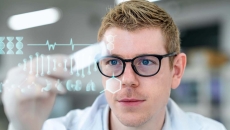Emerging Technologies
Digital health stakeholders said that AI will be used next year to help ease administrative tasks for providers, improve clinical trial participation and increase transparency in healthcare.
The California-based company will use the funds to expand its Whole Body Twin Technology, aimed at preventing and reversing metabolic disease.
Davidi Vortman, CEO of UltraSight, discusses the company's AI-driven cardiac-imaging technology that helps providers quickly and efficiently triage patients and the ways the FDA-cleared system is used in the U.S. and globally.
Rock Health's Digital Health at the Turn of 2024 report found retailers as providers and data interoperability are scaling innovations in the sector, with lasting trajectories.
The tech giant revealed it created an LLM optimized for diagnostic reasoning with the ability to generate a differential diagnosis or assist clinicians in coming to a diagnosis.
Execs overwhelmingly cite genAI as having the most significant impact in healthcare this year, though others provide alternative takes on the years' events.
The companies will leverage Absci's AI-enabled Integrated Drug Creation platform and the pharma giant's oncology research and development expertise.
Dr. Michael Howell, chief clinical officer at Google, discusses Med-PaLM's evolution in 2023 and recommendations for regulators developing rules for AI use in healthcare.
Researchers will study how Rion’s Purified Exosome Product may aid service members with pulmonary disease via a collaboration with the U.S. Army Medical Research Institute and Mayo Clinic, says Dr. Atta Behfar, Rion’s CEO and cofounder.
An automotive manufacturer in Japan has transformed its speech-to-text mobile app to an audio recognition system to help alleviate barriers in communication.






